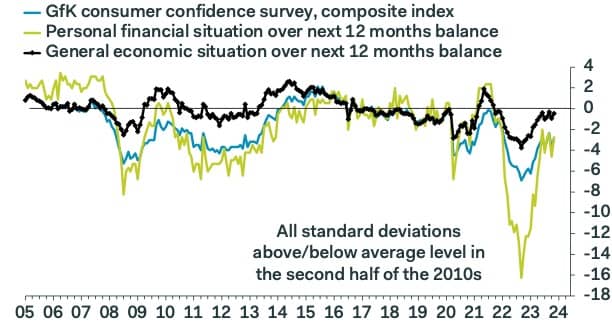Consumer Confidence Boosted By Rising Real Incomes, Falling Mortgage Rates
- Written by: Gary Howes

Image © Adobe Stock
A much-watched survey has revealed a rise in consumer confidence in November driven by rising real incomes and falling mortgage rates.
GfK's Consumer Confidence Index increased six points to -24 in November, with all five measures rising in comparison to October, when an unexpected decline was announced.
"It is good to see that consumers are more optimistic about their personal financial situation. This shows people are thinking about their future with increased confidence and willingness to look beyond the short-term," says Joe Staton, Client Strategy Director at GfK.
GfK reports consumers are feeling more confident about their financial situation in the coming 12 months when contrasted to the previous 12 months. The same trend can be seen on expectations regarding the economy.
Above image is courtesy of Pantheon Macroeconomics.
Economist Gabriella Dickens at Pantheon Economics says confidence has started to rebound, driven by an increase in real incomes and falling mortgage rates.
"We expect confidence will continue to strengthen, as real disposable income picks up, supported by a further period of catch-up growth in real wages and an easing drag from mortgage refinancing. At the margin, the two percentage point reduction in the main rate of National Insurance contributions in January, which will boost aggregate disposable income by about 0.5%, also likely will bolster sentiment," says Dickens.
The findings come a day after the S&P PMI survey revealed the UK economy likely returned to growth in November, with pay and employment also staying robust, lowering the odds the UK would fall into a recession in the short term.
However, the Bank of England will be attuned to the resilience in consumer sentiment and the labour market, ensuring that the odds of rate cuts in the first half of 2024 have fallen over recent days.
This reduction in rate cut bets has supported UK bond yields and the Pound this week and sets it up for a firmer end to 2023.
"The data supports the theory that the UK economy is improving and moving away from the risk of a recession," says David Croy, a strategist at ANZ Bank. "Could that pose upside risks for GBP?"




